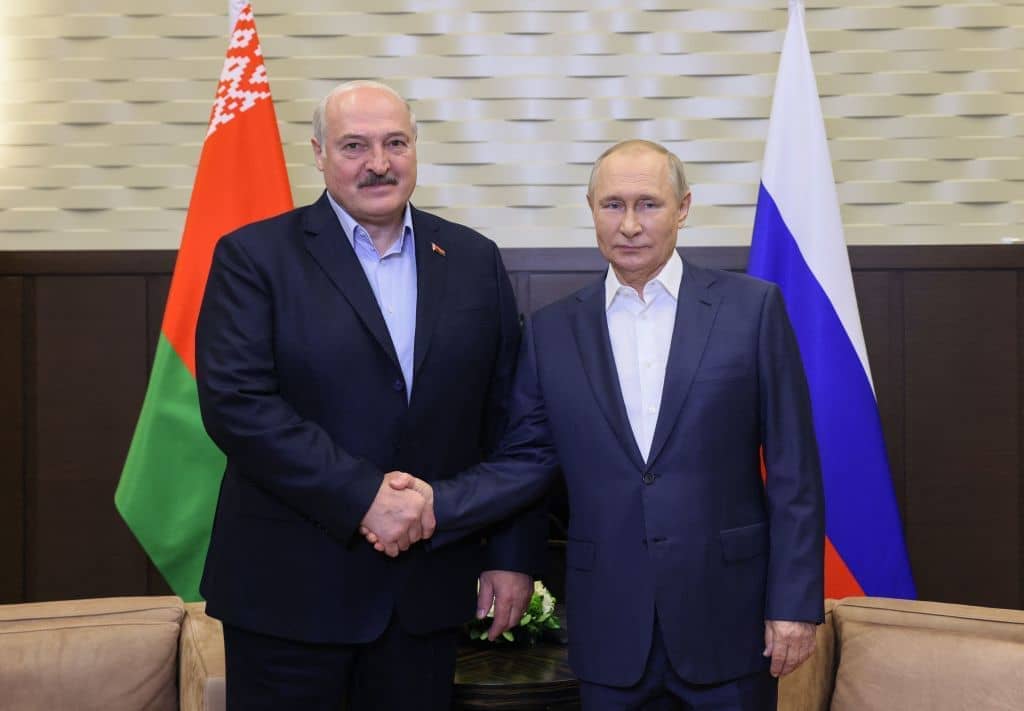Putin’s war in Ukraine is not going his way. As the screw tightens on him, what options does he have left up his sleeve? There remains, of course, the possibility that Putin could, at some point, choose to deploy nuclear weapons – he himself has threatened this enough times. But there is also Belarus. Controlled by Alexandr Lukashenko, currently in his sixth term as president thanks to an election in 2020 rigged in his favour with Putin’s help, the country has sat on the fringes of the war since it began.
On Monday, as Putin launched his latest attack on Ukraine, Belarus announced that, together with Russia, it was deploying a joint regional forces group to its borders in response to the ‘worsening situation’ in Ukraine. What the purpose of this joint group is remains to be seen, with little intel currently available on how many troops will be deployed, or what their true purpose is.
Belarus has been a staging ground for the war since February, allowing Russian missiles and troops to attack from its territory. But this announcement prompted fears that, for the first time, Belarus would actively engage in the conflict.
To be deposed by Putin or his own people – in the end that is the choice Lukashenko will have to make
Were Belarus to actively engage in the war, it would benefit Putin. It would provide more manpower to back up the Kremlin’s fast-depleting troops and would divert Ukrainian forces to Ukraine’s northern border, forcing them to spread their defences thinner. Belarusian president, Alexandr Lukashenko owes his own grip of power to Putin, and there is a fear that that debt could successfully be called in at any moment.
For Lukashenko, however, it is not as clear cut as simply throwing his lot in with Putin. Holding him back is the knowledge that domestic support for Belarus becoming involved in the conflict is incredibly low (some research suggests it’s as little as 3 or 4 per cent). The more Lukashenko entangles the country in the war, the more precarious his position as leader becomes. Should civil unrest break out, he couldn’t guarantee the support of his own army in suppressing it – and could, in that situation, be credibly overthrown.
He also knows that, were this to happen, Putin would be unlikely to come to his aid. For now, Lukashenko is useful to him: so far he has been able to keep the country compliant on his behalf and has been helpful in the war. But, if he’s deposed, or refuses to cooperate with Putin, his use ends. You could call it a catch-22 situation.
Rumours are circulating that Lukashenko is organising a mobilisation by stealth. Belarusian independent newspaper Nasha Niva has cited anonymous sources who claim the president wants to disguise the mobilisation as a ‘combat capability check’, starting with recruitment in the country’s rural regions. Apparently, Lukashenko’s reason for not announcing anything publicly is because he recognised how disastrously Putin’s partial mobilisation has played out.
So, will Lukashenko help Putin escalate the war in Ukraine? Critical to understanding what he might do, says Franak Viacorka, special advisor to leader of the Belarusian democratic movement Sviatlana Tsikhanouskaya, is recognising that Lukashenko’s primary concern is saving his own skin. ‘He’s just thinking about his own survival, he’s not thinking about the interests of the government or his political career. For him, what’s most important is saving his own life and those of his family.’
In recent months, Lukashenko has not shied away from making comments on the progress of Putin’s war. Indeed, even when announcing the joint regional forces deployment, he commented ‘Last thing [Russia] needs is another conflict. You know they have enough problems.’ His fence-sitting can be taken at face value: he’s hedging his bets.
It is too early to say whether rumours of a Belarusian mobilisation will come to fruition or whether they will see active combat. Ukraine is taking Lukashenko’s rhetoric seriously, with Zelensky calling on the G7 to send peacekeepers to their mutual border to watch for any signs of a ‘false flag’ attack Belarus could use as an excuse to enter the fray.
The more desperate Putin becomes, the more likely he is to apply pressure on Lukashenko send his troops into active warfare. But Lukashenko knows he faces a lose-lose situation. To be deposed by Putin or his own people – in the end that is the choice Lukashenko will have to make.







Comments